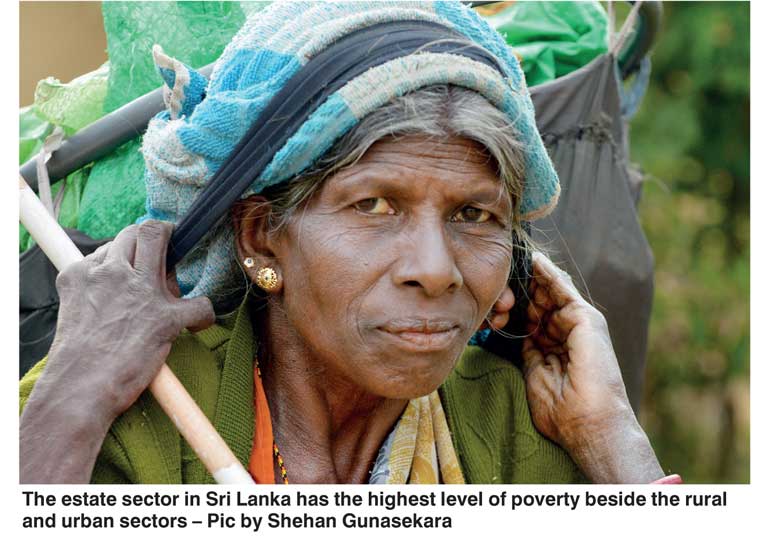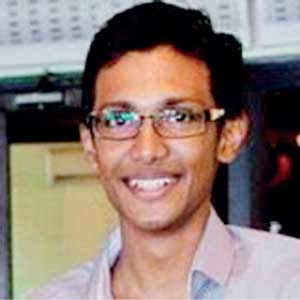Thursday Feb 19, 2026
Thursday Feb 19, 2026
Saturday, 5 November 2016 00:01 - - {{hitsCtrl.values.hits}}
 By Neranjan Maddumage
By Neranjan Maddumage
For a long time, I have wanted to write an article addressing a global issue with a subjective point of view. I enjoy addressing development issues with an impressionistic style, no matter how readers comprehend or react to it. I strongly believe such impressionistic views could establish new approaches to address common social issues like poverty or gender inequality.
The World Bank reported this year that Sri Lanka has made encouraging progress in reducing poverty to below 7% of the population. Nevertheless, ‘pockets of severe poverty remain and future prosperity will depend on addressing chronic revenue shortfalls and fostering a more competitive and inclusive economy’. Superficially the World Bank announcement seems to be a positive one, but  we still have a long way to go. Anyway the intention of this article is not to make a scientific analysis on poverty in Sri Lanka. Therefore, the explanation given by this article could be rational or irrational.
we still have a long way to go. Anyway the intention of this article is not to make a scientific analysis on poverty in Sri Lanka. Therefore, the explanation given by this article could be rational or irrational.
It is commonly believed that poverty was produced by the society itself, but more precisely it emerged out of the social changes. I personally believe that poverty was an inevitable part of human civilisation and social evolution. In the early stages of human civilisation, resource abundance left no space for poverty; as people’s basic human needs were satisfied. Then with the gradual increase of world population, resources started becoming scarce. Arguably this might have led to the birth of poverty.
It is commonly accepted that poverty can be eradicated by education. In my opinion this is a half-truth, especially in relation to Sri Lanka. Firstly, the local education system must be reformed to eradicate poverty in the country. Presently, the persistent education system has almost no ability or strength to eliminate poverty in Sri Lanka.
In my opinion, we live in a country where the institutionalised education is just a ladder to climb up from a lower social class/status to an upper social class/status. So individual people do it in their own capacities, but unfortunately that does not make a structural change in the society. Therefore, if Sri Lanka wants to eradicate poverty through education, first of all the education system should be radically reformed in a productive manner.
As an example, the estate sector in Sri Lanka has the highest level of poverty beside the rural and urban sectors. People of the estate sector rarely enjoy the benefits of free education. But those who do, end up entering politics and representing their estate in national politics. Such political representatives often have a very strong vote base due to the segregation of estate sector. However, it is really questionable whether these political representatives have make a serious commitment to eradicating poverty in their hometown.
This has been a common scenario for many decades, where the educated minority represents the rest of the poor majority in national politics, but there is still no apparent progress in the quality of life.
Is it possible that sometimes poverty can be beneficial for countries like Sri Lanka? This country is heavily dependent on foreign aids and loans. Sri Lanka has achieved the status of a lower-middle income country, so foreign governments and institution do not see it as necessary to grant aids to our nation. In fact, as a country we are desperately in need of formulating new strategies to attract foreign aids. Finding sustainable solutions to eradicate poverty in a country like ours is not simplistic.
GDP per capita in Sri Lanka averaged at $ 1449.91 from 1961 until 2015, reaching an all-time high of $ 3637.54 in 2015, as reported by the World Bank. The increase of per capita income has brought both pros and cons to Sri Lankan economy. From a welfare point of view, it is a positive indicator because the purchasing power of citizens has improved. But from an investment point of view, this might hinder economic development of the country in the long run because higher per capita income results in higher cost of investment for potential investors. Foreign investors tend to seek destinations where they can find cheap labour to lower their cost of production. In fact, for a country highly dependent on FDI, higher level of per capita income might be a restriction to FDI in the long run.
The yesteryear political regimes made many efforts to develop and implement various models of poverty eradication and development projects, but these projects suffered in the implementation phase due to practical failures. Politicisation is a common reason for all sorts of failures in government led development projects. No matter how successfully the policy has been developed, the outcomes of such policies depends on implementation.
Some poverty eradication projects were more like public welfare projects. If we carefully review past projects which were implemented (by various yesteryear governments) to eradicate poverty, we can understand that most ended up becoming welfare projects due to politicisation. Political leaders often use these development and poverty eradication projects as a part of their election campaigns, with the intention of protecting their vote base.
Ultimately these projects are implemented in a very superficial manner, rather than making a real social transformation, like some of the mass scale land distribution projects and housing projects. The bottom-line is that the problem with development in Sri Lanka, is mostly the problem of non-implementation.
(UNLOCKED is a space for Sri Lankan youth to express their views and opinions on development with the aim of creating positive change in the world. The views expressed in the blogs are solely those of the authors. UNDP Sri Lanka and Daily FT does not represent or endorse the views expressed in these blogs. Read more about the UNLOCKED initiative www.lk.undp.org.)
[Neranjan Maddumage is a final year undergraduate from General Sir John Kotelawala Defence University, and has also completed his Professional Qualification in Human Resources Management (PQHRM) at Institute of Personnel Management, Sri Lanka. He has first-hand work experience in the corporate sector as he successfully completed his internship at Hirdaramani Industries, Maharagama where he was attached to its HR department and then at Chart Consultants, Colombo 2, in the capacity of a Trainee HR and Admin Executive. Neranjan is enthusiastic about social research and development studies and seriously considers pursuing a career in the field of research and development. He is particularly interested in fields such as development studies, gender studies, political science, peace building and reconciliation rural development, entrepreneurship and public policy development.]